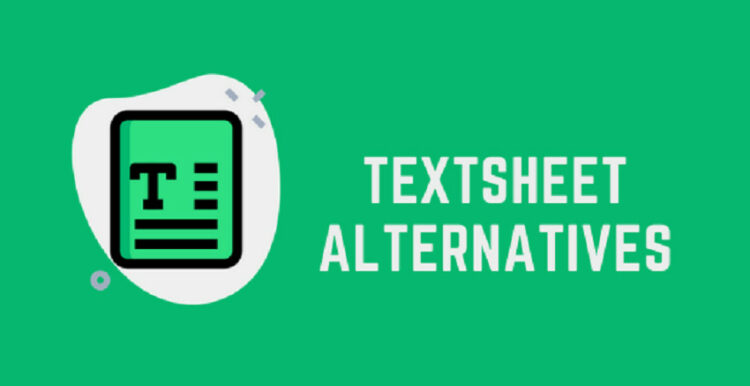Introduction
In today’s fast-paced world, students often find themselves overwhelmed with academic tasks and assignments. To cope with the increasing workload, many students turned to online platforms like Textsheet, which provided solutions to textbook questions and other educational resources. However, Textsheet faced legal challenges due to copyright infringement, leading to its shutdown. In this article, we will explore Textsheet and its alternatives, helping students discover efficient study resources to excel in their studies.
What Was Textsheet?
Textsheet was a popular educational platform that provided solutions to textbook questions, allowing students to grasp complex concepts with ease. It gained immense popularity for its user-friendly interface and the vast collection of study materials it offered. Students could access step-by-step answers to their textbook queries, making it a valuable tool for learning and exam preparation.
The Downfall of Textsheet
As the popularity of Textsheet grew, so did the concerns of copyright infringement. The website utilized copyrighted material from various educational publishers without proper authorization, leading to legal actions against the platform. Eventually, Textsheet faced a shutdown, leaving students searching for viable alternatives to fill the void.
Top Alternatives to Textsheet
-
Chegg
Chegg is a widely recognized educational platform offering textbook solutions, online tutoring, and study guides. It provides a vast database of textbook answers and explanations, making it an ideal alternative to Textsheet. Additionally, Chegg’s tutoring services allow students to get personalized assistance from subject matter experts.
-
Course Hero
Course Hero is another popular platform that provides access to a wide range of study resources. Students can find study guides, class notes, and textbook solutions to aid their learning journey. Course Hero also encourages students to share their own study materials, creating a collaborative learning environment.
-
Khan Academy
Khan Academy stands out for its comprehensive collection of educational videos and interactive exercises. While it may not offer textbook-specific solutions like Textsheet, it covers a wide array of subjects and topics, making it an excellent resource for self-paced learning.
-
Slader
Slader focuses on high school and college-level textbook solutions. Students can find answers to questions from popular textbooks in subjects like mathematics, science, history, and more. The platform allows users to discuss and collaborate on solutions, promoting a deeper understanding of the material.
-
Studylib
Studylib offers a vast repository of study materials, including documents, presentations, and educational resources. Students can find solutions to textbook questions, practice exams, and study guides across various subjects.
How to Make the Most of Educational Platforms
Using educational platforms efficiently can significantly impact a student’s academic journey. Here are some tips to make the most of these resources:
-
Set Clear Goals
Define your learning objectives before using any platform. Knowing what you need help with will guide you to the right resources and improve your overall study efficiency.
-
Use Them as Supplementary Resources
Educational platforms are meant to assist, not replace, traditional learning methods. Use them to supplement your classroom teachings and reinforce your understanding of complex topics.
-
Engage in Active Learning
Don’t passively read through solutions; engage with the content actively. Attempt the questions yourself before referring to the answers, and ensure you comprehend the reasoning behind each step.
-
Collaborate with Peers
Consider studying with friends or classmates. Collaboration fosters a deeper understanding of concepts and can lead to innovative approaches to problem-solving.
Conclusion
In conclusion, while Textsheet might be a thing of the past, there are numerous alternatives available for students seeking additional help with their studies. Platforms like Chegg, Course Hero, Khan Academy, Slader, and Studylib offer a wealth of educational resources to enhance learning experiences. By using these platforms strategically and actively engaging with the content, students can excel in their studies and achieve academic success.
FAQs
- Is it safe to use educational platforms like Chegg and Course Hero?
Yes, these platforms prioritize user security and privacy. However, always ensure you follow their guidelines and terms of service.
- Are the solutions on Khan Academy reliable?
Khan Academy’s content is created and reviewed by educators, making it a trustworthy resource for learning.
- Can I access Slader’s solutions for free?
Slader offers a mix of free and premium content. While some solutions are free, a subscription may be required for complete access.
- Is Course Hero’s user-generated content reliable?
Course Hero encourages users to provide accurate information. Still, it’s essential to cross-check information and use critical thinking.
- How can I make the most of Studylib’s study materials?
Use Studylib’s resources to reinforce your understanding and explore different perspectives on the subject matter. Engage in discussions to gain insights from other users.

